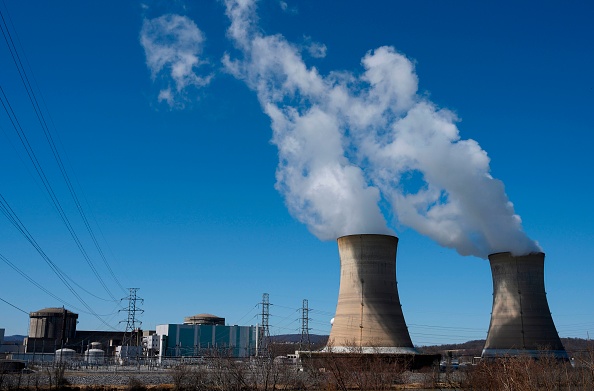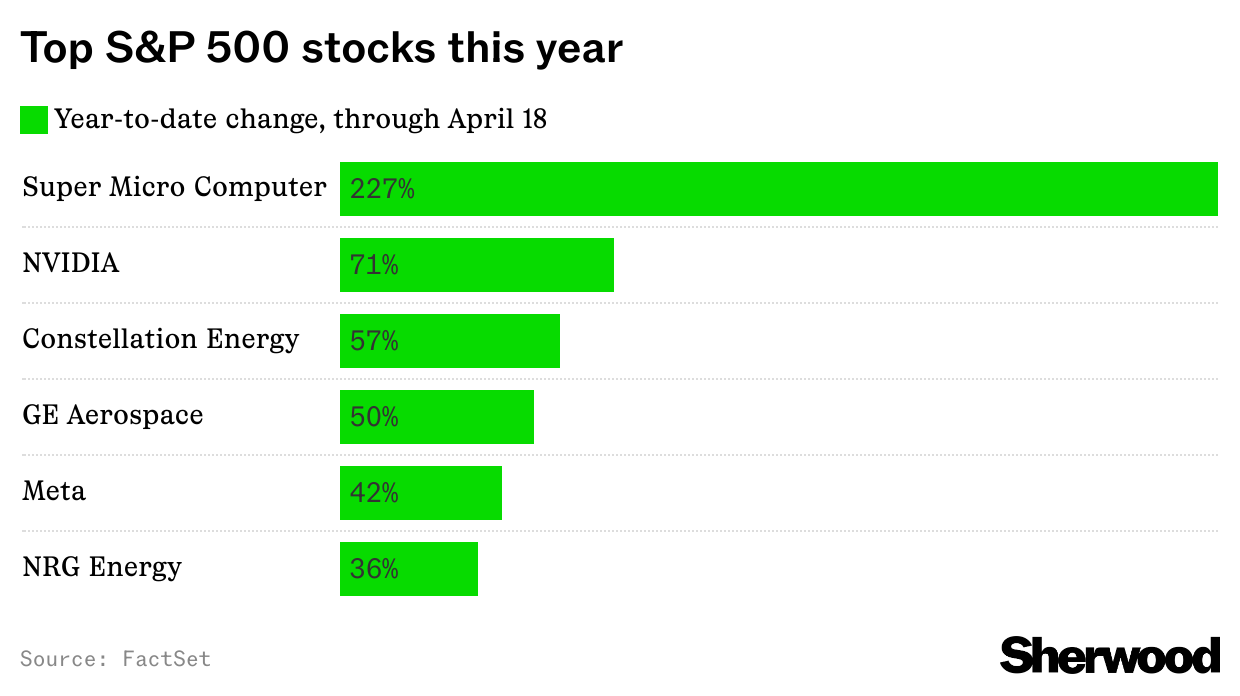Monday May.02, 2022
🛡️ Earnings get defensive
The pantry-staple defensive wall (George Frey/Getty Images)
Hey Snackers,
RIP, selfie sticks: Snap is launching a mini drone called Pixy that follows you around snapping pics before landing back in your palm.
The market theme of April: big red. The S&P 500 had its worst month since March 2020, while the tech-heavy Nasdaq capped off its worst month since 2008, plunging a whopping 13%. Big Tech earnings weren’t encouraging for investors, who are stressing over sticky inflation and a hawkish Fed. The central bank is set to raise rates again this week.
D-Fence
From Amazon to Coke, earnings season underscores a shift to defense as econ gloom grows
New season dropped... We're not talking “Ozark.” Investors have had eagle eyes this earnings season on how corporates are managing a unique economic hot mess (inflation, war, China's Covid crackdown). What we've learned so far:
- High-growth sectors like tech, which thrived mid-rebound, have hit a wall as sales slow, and they’re tightening their belts to prep for more pain. Ditto other "cyclicals" (think: banks, construction), which typically do well when the economy thrives.
- "Non-cyclicals" — which tend to hold steady regardless of how the economy is doing (think: consumer staples, utilities) — outperformed.
- In context: The World Bank slashed its forecast for global economic growth, US GDP shrank last quarter, and some analysts warn a recession’s coming.
Change is the only constant... A year ago, the "Big Tech 5" demolished earnings with jaw-dropping records. The economy was in full rebound mode and cyclicals were raking it in. Now:
- Tech: Amazon had its slowest sales growth since the dot-com bust (the late ’90s), while Meta posted its slowest growth since going public in 2012. Google’s biz is also slowing, while Netflix expects to lose millions more subscribers. Apple was strong but said chip shortages would keep slowing its growth. The outlier: Microsoft beat across the board.
- Banks: From Citi to Chase to Goldman, America’s largest banks reported double-digit earnings declines as trading and dealmaking slowed.
Versus…
- Staples: Pepsi, Kraft, and Oreo maker Mondelez saw strong growth. Coke's sales tripled from last year. Procter & Gamble (Gillette, Tide, Charmin) notched its biggest sales gain in decades.
- Oil: Chevron's quarterly profit quadrupled thanks to higher energy prices, while Exxon's nearly doubled despite a big hit from Russia.
- Pharma: Merck and AstraZeneca beat expectations as demand spiked for Covid treatments and other key drugs.
The market’s getting defensive… It used to be “growth at all costs” — now it’s “steady earnings and cut costs.” Amazon, Meta, and Netflix plan to slow investments and be more financially disciplined. Companies and investors are getting used to the “new not normal” environment: persistently high inflation and supply shocks. While the techy Nasdaq just had its worst month since 2008, the pile-on into defensive stocks could continue.
Zoom Out
Stories we’re watching...
Face-palm… Palm oil, which is in half of your groceries, is about to get pricier. Indonesia, the world’s largest palm-oil producer, banned exports to keep prices in check for local consumers. That’s bad news for Hormel, Colgate-Palmolive, and Yum! Brands, who use palm oil in Skippy peanut butter, toothpaste, and even KFC chicken. Global food supplies were already strained by Russia’s war on Ukraine and historic droughts. Now Indonesia’s ban could send record food prices higher — especially in poorer countries that depend on palm oil for cooking.
Don’t forget to call Mom… Sunday’s Mother’s Day. For America’s 30M+ working moms, the past two years have been disproportionately hard. Mothers have been more likely to work in service jobs heavily affected by pandemic closures, and they’ve been 3X as likely as fathers to lose their jobs early on during lockdowns. Nearly 2M women still haven’t returned to the labor force, and economists aren’t sure how many of them ever will. Those who do face a “motherhood penalty” — a pay gap between moms and non-moms that can be wider than the pay gap between men and women.
Events
Coming up this week...
Big pharma’s vaccine ceiling… A year ago, the US was in the thick of the biggest vaccination campaign in history. Now, about two-thirds of the population is fully vaccinated, and Dr. Fauci says we’re “out of the pandemic phase.” Pfizer and Moderna, now household names, are looking for their next profit puppies. Pfizer, with a diverse drug portfolio and pipeline, is expecting a $22B boost this year from its Covid antiviral pill, while Moderna is trying to be the first to bring its vax to little kids. We’ll get a checkup on the vax makers’ next bets when both report this week.
Grab a mint julep and your lucky hat… because the Kentucky Derby’s this weekend, and it’s gonna be packed. Churchill Downs, the $8B (valuation) casino biz that runs the iconic horse race, is entering its big weekend feeling lucky: last week it reported record sales and profits for last quarter. Churchill grew its online gambling biz during the pandemic, when IRL betting was restricted. Now that gamblers are returning to the track, business is booming. Churchill expects to post record Derby revenue this weekend as possibly 3X as many fans attend compared with last year.
ICYMI
Last week's highlights...
- iConomy: Apple’s coming off one of its best quarters ever. While supply issues and growth slumps have hurt fellow tech stocks, the Fruit’s been resilient thanks to 5G upgrades and its connected ecosystem of tech and software.
- Contour: Viral D2C makeup brand Oddity debuted a blockchain-based token that converts into company stock if/when it IPOs. Tokens could be a bridge between the new world of digital assets and OG markets.
- Thread: Three weeks and $44B after Elon Musk started poking around Twitter, he’s on the verge of owning the world’s most influential platform. High priority: making the bird app a bastion of free speech.
What else we’re Snackin’
- Reuse: Retail’s hottest new revenue source: your old clothes. Brands from Lululemon to Hugo Boss are rolling out resale programs and labeling them sustainable. But experts say it doesn’t fix the industry’s environmental issues.
- Stream: Insiders say Netflix’s high-volume content strategy is to blame for subscriber losses and the “Walmart-ization” of the streamer, as it cranked out as many as 140 shows a year.
- Forgive: President Biden might cancel $10K in student debt per borrower. Some see it as a step to stir up support among those disproportionately affected by student loans: young and Black voters.
This Week
- Monday: End of Eid al-Fitr. Earnings expected from Moody's, Enterprise, Expedia, ON Semiconductor, Clorox, Logitech, and Six Flags Entertainment
- Tuesday: Earnings expected from Avis, Pfizer, Estée Lauder, Airbnb, Starbucks, Hilton, AMD, Molson Coors, Public Storage, Lyft, and Caesars Entertainment
- Wednesday: Fed interest-rate decision. Earnings expected from Match Group, CVS, Regeneron, Uber, Marriott, Moderna, eBay, Fox Corp., Etsy, GoDaddy, and The New York Times Co.
- Thursday: Weekly jobless claims. Cinco de Mayo. Earnings expected from Allstate, Shell, ConocoPhillips, Anheuser-Busch InBev, Block, Shopify, DoorDash, Lucid Group, Nio, Live Nation, Kellogg, Royal Caribbean, Planet Fitness, and AMC
- Friday: Monthly employment numbers. Earnings expected from Zillow, Berkshire Hathaway, Cigna, DraftKings, and Madison Square Garden Entertainment
- The weekend: The Kentucky Derby is Saturday. Mother’s Day is Sunday
Authors of this Snacks own: shares of Amazon, Apple, Moderna, Google, Microsoft, Starbucks, NYT, Block, Berkshire Hathaway, Netflix, Snap, Pfizer, Walmart, and Twitter
ID: 2180262
.png)

